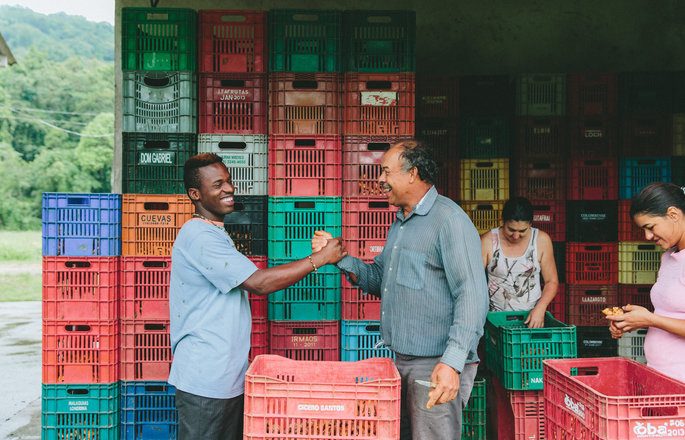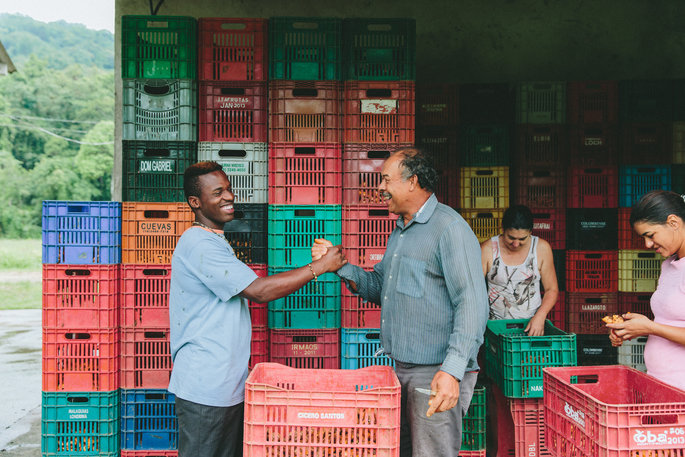
Thanks to the persistence of social innovators across the country, every day we see strategies that are working and delivering results in a rapidly changing world. This ongoing blog series will highlight the voices of our Coalition of more than 70 social innovators and their solutions to our country’s most pressing social problems, as well as examples of how this powerful work can be transformed into national change. Today we will hear from Abby Falik, Founder and CEO of Global Citizen Year, about the importance of leveraging service and global bridge year opportunities to prepare today’s youth for college, career, and beyond.
When I graduated high school, I called the Peace Corps. I had spent 18 years in a classroom and I was hungry to do something real in the world. While sympathetic, the Peace Corps told me to come back in four years. It was frustrating. Why were a religious mission or military service my only options for accessing real-world learning through international service? Why wasn’t there an opportunity for an 18-year-old to do other forms of public service in a global context?
At 20, I left Stanford to head to Brazil for one year with a backpack and the address of an NGO I’d heard was happy to put me to work. The experience was aggravating: I was thrown into a classroom without language skills, cultural familiarity or context. It was eye-opening: the kids I worked with lacked opportunity but not curiosity or intelligence. And it was affirming: I returned to Stanford with a deep sense of purpose, yet frustrated I had just one year remaining on campus.
The experience was so formative that it became the foundation for my life’s work. Ever since, I’ve been focused on answering a single question: how can we make global immersion and service normalized and accessible parts of every student’s educational path?
This focus is particularly relevant today as our society is facing a crisis in preparing youth for college and beyond. One-third of college freshmen don’t return for a second year and only 50% graduate within six years. And while 96% of colleges believe their graduates are ready for the workforce, only 11% of employers concur.
At the same time, we are not preparing young people for the complex, global world into which they graduate. Only 10% of college students study abroad – more than half of whom go to Western Europe – and most programs have students live with other Americans while taking classes in English. Meanwhile, we know that just 1% of American adults are proficient in a foreign language studied in a classroom.
Our best chance of addressing our planet’s greatest challenges – climate change, terrorism, extreme poverty – lies in the hands of our next generation of leaders, and their ability to forge creative collaborations across significant lines of difference. To be effective, these leaders need empathy, cross-cultural fluencies and entrepreneurial mindsets – or, as we like to call them, “power skills.” And yet, these are not emphasized in schools.
 At Global Citizen Year we’re on a mission to make an immersive, global “bridge year” after high school a new rite of passage for today’s emerging leaders. Each year we recruit and train a diverse corps of “Fellows” – 80% of whom receive need-based financial aid – and place them as apprentices in communities across Latin America, Africa and Asia. Fellows’ placements are diverse and could include serving as a teacher’s assistant at a high-poverty school in India, an eco-tourism guide at a nature reserve in Ecuador, an extra set of hands at a maternity ward in Senegal, or a field researcher for a social enterprise in Brazil. Through a deliberate mix of cultural immersion, experiential learning, and leadership training, our Fellows develop the language fluency and global skills needed to lead across countries, cultures, and sectors.
At Global Citizen Year we’re on a mission to make an immersive, global “bridge year” after high school a new rite of passage for today’s emerging leaders. Each year we recruit and train a diverse corps of “Fellows” – 80% of whom receive need-based financial aid – and place them as apprentices in communities across Latin America, Africa and Asia. Fellows’ placements are diverse and could include serving as a teacher’s assistant at a high-poverty school in India, an eco-tourism guide at a nature reserve in Ecuador, an extra set of hands at a maternity ward in Senegal, or a field researcher for a social enterprise in Brazil. Through a deliberate mix of cultural immersion, experiential learning, and leadership training, our Fellows develop the language fluency and global skills needed to lead across countries, cultures, and sectors.
Since our launch in 2010, we’ve grown our operation tenfold. Our 450 alumni are thriving in college and careers, and have been honored as Fulbright Scholars, Davis Peace Prize winners, Teach For America corps members, and, yes, Peace Corps volunteers. Ninety-five percent of our alumni – and 91% of alumni from low-income backgrounds – have graduated college or are on track to do so, the vast majority in four years or less.
Our next President will enter office with the opportunity to reimagine higher education as an engine for creating global citizens and leaders, and we are thrilled to partner with America Forward to highlight a few policy ideas for the nominees’ consideration. While the campaign trail has seen much discussion about making college affordable, the overlooked question is: what will make college count?
The next administration would be wise to pursue policy solutions that evolve our system of higher education to meet the needs of the 21st century, including:
- Unlocking federal student aid, including Pell Grants, for service year programs;
- Establishing new ways to accredit out-of-classroom experiences that accelerate college and career readiness;
- Incentivizing colleges to award credit for meaningful bridge year experiences that drive academic success; and
- Orienting State Department programs to dramatically expand opportunities for young Americans to have immersive experience in the developing world.
As Malia Obama embarks on her own bridge year before enrolling at Harvard, I am struck by the progress we’ve made in the 18 years since I graduated high school toward recognizing that a purposeful “year off” (or, better yet, “year on”) can better prepare young people for college and the world beyond. I firmly believe that 18 years from now, when my sons are ready to pursue a higher education, Malia’s path will be the norm and America’s education system will be a launching pad for a new generation of global leaders.
Read more about how social innovators in the America Forward Coalition, like Global Citizen Year, are solving America’s biggest problems in communities across the country every day in our briefing book, Moving America Forward: Innovators Lead the Way to Unlocking America’s Potential, and join the conversation. Follow @GlobalCitizenYr and @America_Forward, and tell us how service opportunities have impacted your life using #AFPresidential16.
Leave a Reply
You must be logged in to post a comment.